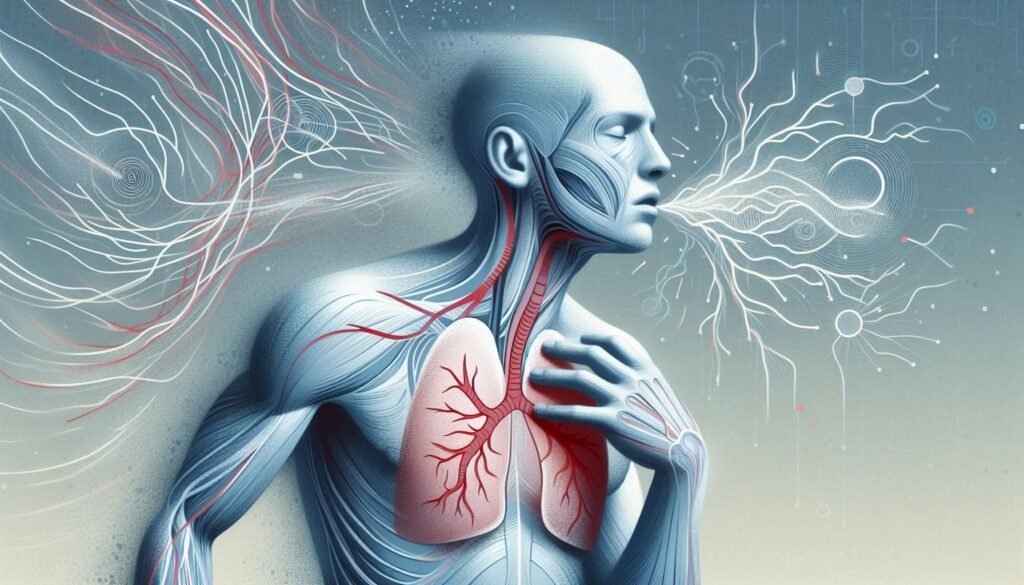Neuroticism and respiratory symptoms may seem like an unlikely pairing, but the connection between our minds and bodies runs deep. As we navigate through life, our emotional states can significantly impact physical well-being. Neuroticism, characterized by anxiety, moodiness, and emotional instability, plays a crucial role in this intricate mind-body relationship.
For many individuals grappling with neurotic traits, respiratory issues such as breathlessness or increased sensitivity to environmental factors become frustrating companions. The psychological weight of these experiences often goes unrecognized but can profoundly influence overall health management.
In this blog post, we’ll unpack the fascinating interplay between neuroticism and respiratory symptoms—exploring how mental processes shape our breathing patterns and lung function. Join us on a journey to better understand this dynamic relationship while uncovering strategies for improved respiratory health management tailored for those dealing with neurotic tendencies.

Neuroticism: A Key Player in Mind-Body Connections
Neuroticism is a personality trait that encompasses emotional instability, anxiety, and mood fluctuations. Individuals high in neuroticism often experience heightened sensitivity to stressors. This psychological state can manifest physically in various ways, particularly affecting respiratory health.
Research shows that those with neurotic traits may be more aware of bodily sensations. This hyper-awareness can lead to an exaggerated perception of normal breathing patterns or minor changes in respiratory function. As a result, everyday experiences like exercise or allergies might trigger feelings of breathlessness.
The mind-body connection becomes crucial as chronic stress from neuroticism can exacerbate respiratory symptoms. Stress hormones impact lung function by causing inflammation and constriction of airways. Consequently, individuals may find themselves caught in a cycle where anxiety worsens their physical symptoms.
Understanding the role of neuroticism offers valuable insights into managing both mental and physical health effectively. By addressing these connections, we can develop strategies for improved well-being across the spectrum of our lives.
Understanding Respiratory Symptoms: From Normal to Pathological
Respiratory symptoms can vary widely, ranging from normal responses to environmental changes to indications of serious health issues. Understanding this spectrum is crucial for effective management and treatment. Normal respiratory responses include occasional breathlessness during exercise or minor coughing due to irritants.
Pathological symptoms, however, often signal underlying conditions that require attention. Chronic coughs, wheezing, and persistent shortness of breath might suggest asthma, chronic obstructive pulmonary disease (COPD), or even infections like pneumonia. Recognizing when a symptom transitions from normal to pathological is essential for timely intervention.
Additionally, factors such as age and pre-existing medical conditions can influence how individuals experience these symptoms. For instance, older adults may have diminished lung capacity that makes them more susceptible to complications.
Awareness of the nuances between typical variations in breathing and concerning signs empowers individuals to seek help sooner rather than later. This proactive approach plays a significant role in maintaining respiratory health and preventing severe outcomes related to respiratory illnesses.
The Neuroticism-Respiratory Link: Exploring the Psychological Impact on Breathing
Neuroticism significantly influences how individuals perceive and respond to physiological sensations, particularly concerning breathing. Those high in neurotic traits often report heightened sensitivity to bodily signals. This can lead to an exaggerated awareness of respiratory symptoms, fostering a cycle of anxiety.
Research indicates that people with elevated neuroticism may experience more frequent breath-related issues. For example, they might misinterpret normal variations in their breathing as signs of serious health problems. This misperception exacerbates feelings of panic or distress.
Moreover, the psychological impact extends beyond mere perception. Anxiety can trigger physical changes such as rapid shallow breathing or hyperventilation. These patterns complicate respiratory control and affect overall lung function.
Understanding this link is crucial for developing effective interventions tailored to individuals with high neuroticism levels. Addressing both the mental and physical aspects could improve patient outcomes by easing symptom perceptions related to respiratory health.
Stress, Anxiety, and Breathlessness: The Neurotic Experience
Neuroticism often amplifies stress and anxiety, leading to heightened experiences of breathlessness. Individuals high in neurotic traits may find themselves more sensitive to everyday pressures. This increased sensitivity can trigger a feedback loop where anxiety intensifies feelings of shortness of breath.
When faced with stressful situations, neurotic individuals may interpret normal physiological responses as alarming symptoms. For example, an elevated heart rate or slight tightness in the chest can be perceived as severe distress signals. This misinterpretation fuels further anxiety and reinforces their worries about breathing difficulties.
The cycle continues as they become hyper-aware of their breathing patterns. Each gasp or sigh is scrutinized, creating a sense of impending doom that exacerbates respiratory issues. In turn, this exacerbation leads to even greater levels of stress.
Understanding this connection is crucial for effectively managing these symptoms. Addressing both psychological aspects and physical sensations can help break the cycle, allowing for improved respiratory health amidst emotional turmoil.
Hypervigilance and Symptom Perception in Neurotic Individuals
Hypervigilance is a common trait in individuals with neuroticism. This heightened state of awareness often leads them to scrutinize their bodily sensations closely. As a result, even minor changes can trigger significant concern or anxiety.
Neurotic individuals are particularly sensitive to respiratory symptoms. They may misinterpret normal variations in breathing as signs of serious health issues. This tendency amplifies feelings of distress and contributes to the perception of breathlessness.
The psychological impact is profound. Constantly monitoring their bodies creates an ongoing cycle of fear and discomfort. Each time they perceive a symptom, they may respond with increased anxiety, which only exacerbates their breathing difficulties.
This hypervigilant behavior reinforces negative thinking patterns about health. Such cognitive distortions can lead neurotic individuals to catastrophize mild respiratory issues into perceived threats, affecting overall well-being significantly.
Psychosomatic Manifestations: When Neuroticism Affects Lung Function
Neuroticism often leads to heightened emotional responses, which can manifest physically in various ways. One particularly intriguing area is how these traits affect lung function. Individuals high in neuroticism may experience psychosomatic symptoms like shortness of breath or a feeling of tightness in the chest.
The connection between anxiety and physiological changes is well-documented. When stress levels rise, the body responds with increased heart rate and rapid breathing. For those prone to neurotic thoughts, this cycle can become self-perpetuating, intensifying their perception of respiratory distress.
Research indicates that people with higher neuroticism are more likely to report respiratory symptoms even when no underlying physical conditions exist. This may lead them to seek medical attention unnecessarily or misinterpret normal bodily sensations as serious health issues.
Addressing these psychosomatic manifestations requires a comprehensive approach. Understanding the link between emotional states and physical symptoms can empower individuals to manage both mental health and respiratory function effectively.
Coping Mechanisms: How Neurotic Traits Influence Respiratory Health Management
Individuals with neurotic traits often experience heightened sensitivity to stress and anxiety. This can significantly impact their respiratory health. Coping mechanisms play a crucial role in managing these symptoms. Understanding how neuroticism influences responses to respiratory challenges can help tailor effective strategies.
One common approach is mindfulness meditation, which encourages individuals to focus on the present moment and regulate breathing patterns. By cultivating awareness of their breath, those with neurotic tendencies may mitigate feelings of panic or discomfort associated with respiratory issues.
Cognitive-behavioral therapy (CBT) also proves beneficial for many. CBT helps reframe negative thought patterns that exacerbate anxiety about breathing difficulties. Through structured sessions, individuals learn healthier coping methods and develop resilience against stressors.
Support groups provide an additional layer of comfort for neurotic individuals dealing with respiratory symptoms. Sharing experiences fosters connection and understanding, empowering them to manage their condition more effectively while reducing feelings of isolation.
The Role of Cognitive Distortions in Respiratory Symptom Reporting
Cognitive distortions significantly shape how neurotic individuals perceive and report respiratory symptoms. These mental patterns often lead to exaggerated beliefs about bodily sensations. When a person with high anxiety feels slight discomfort, they might interpret it as a severe health issue.
Individuals prone to catastrophizing may focus on the worst-case scenarios regarding their breathing difficulties. This tendency can create unnecessary panic, amplifying their awareness of normal sensations and turning them into perceived threats. Such heightened perception complicates any real assessment of lung function or respiratory health.
Moreover, selective attention plays a crucial role in symptom reporting. Neurotic individuals may become fixated on specific bodily cues while ignoring others that could provide context or reassurance. As a result, this skewed perspective reinforces their belief that something is fundamentally wrong with their respiratory system.
Understanding these cognitive distortions is vital for both patients and healthcare providers. By addressing the psychological aspects of symptom reporting, more effective management strategies can be developed to improve overall well-being.
Treatment Approaches: Integrating Psychological and Respiratory Care
Treatment approaches for individuals experiencing neuroticism and respiratory symptoms often require a multifaceted strategy. Integrating psychological care with respiratory health management can yield significant benefits. This collaboration allows healthcare providers to address both the mind and the body, creating a comprehensive treatment plan tailored to each patient’s needs.
Cognitive Behavioral Therapy (CBT) is effective in helping individuals manage anxiety and stress, which are common among those with high levels of neuroticism. By challenging negative thought patterns, patients can gain better control over their emotional responses, potentially reducing associated respiratory symptoms.
Breathing exercises also play a crucial role in this integrated approach. Techniques such as diaphragmatic breathing encourage relaxation and improve lung function. These practices not only enhance physical well-being but also promote mental clarity and calmness.
Moreover, psychoeducation about the relationship between emotions and physical sensations empowers patients. By understanding how neurotic traits influence symptom perception, they can develop healthier coping strategies that mitigate distressing respiratory issues related to their mental state.
Living with Neuroticism: Strategies for Better Respiratory Health
Living with neuroticism can present unique challenges, especially regarding respiratory health. Understanding how neurotic traits influence breathing patterns is vital for developing effective management strategies. One key approach is to cultivate self-awareness around symptoms and emotional responses. This awareness helps individuals recognize when stress or anxiety may exacerbate respiratory issues.
Mindfulness practices, such as meditation and deep-breathing exercises, can significantly alleviate breathlessness linked to neuroticism. Engaging in regular physical activity not only improves lung function but also reduces anxiety levels. Yoga has been particularly beneficial due to its focus on controlled breathing and relaxation techniques.
Moreover, cognitive-behavioral therapy (CBT) can help address negative thought patterns that contribute to heightened symptom perception. By challenging these distorted thoughts, individuals can improve their relationship with both their mental state and physical sensations.
Maintaining a supportive social network also plays a crucial role in managing symptoms associated with neuroticism. Sharing experiences allows for emotional release while gaining insight from others facing similar challenges.
Implementing these strategies fosters resilience against the effects of neuroticism on respiratory health, paving the way for improved overall well-being.


